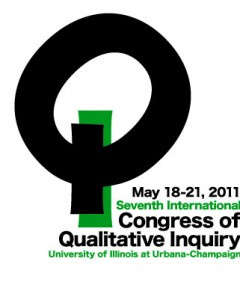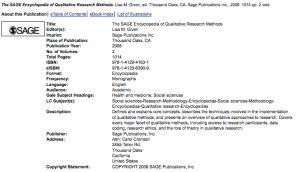Apropros of the discussion in my research class, this article illustrates nicely the ‘voluntary’ nature of compliance with IRBs AND that the agreement (legal and moral) to protect human rights in research contexts is a social convention. The US Department of Defence’s disregard for internationally accepted norms is as outrageous as the historical events that lead to the creation of institutional review boards.
All posts by Sandra Mathison
free citation management app for Firefox
If you use Firefox, Zotero is a free downloadable app that will help you keep track of your reference materials.

Congress of Qualitative Inquiry ~ call for proposals
Sage Encyclopedia of Qualitative Research Methods ~ available online
empathy: the core of human nature
Interpretive and critical research is dependent on human empathy. Empathic thinking is what allows us as researchers to ‘experience’ that which we have never actually experienced. The sense of dread when you hear or see a car wreck; the concern when a baby cries; the fear at hearing a scream. This video explores the evolution of empathy in humans, positing changes that have occurred in our brains over the centuries that enable us to not only understand one another, but to care for one another on a global level. 
ethics ~ navigating IRB’s and doing right
This is an excerpt from Freeman & Mathison’s Researching Children’s Experiences chapters 2, 3 & 5.
Freeman, M. & Mathison, S. (2009), Research Children’s Experiences. New York; Guilford Press.
performative representation
Freeman, Mathison & Wilcox, Performing Parent Dialogues of High Stakes Testing … an example of performance based representation
COOL TOOL: Smartpen
New journal: CRITICAL EDUCATION
The Editorial Team of Critical Education is pleased to launch the inaugural issue of the journal. Click on the current issue link at the top of the home page to read “The Idiocy of Policy: The Anti-Democratic Curriculum of High-stakes Testing” by Wayne Au. Au is assistant professor of education at Cal State University, Fullerton and author of Unequal By Design: High-Stakes Testing and the Standardization of Inequality (Routledge, 2009).
To receive notification of new content in Critical Education, sign up as a journal user (reader, reviewer, or author).
Look for the initial installments of the special section edited by Abraham DeLeon titled “The Lure of the Animal: Addressing Nonhuman Animals in Educational Theory and Research” in the coming weeks.
 Follow
Follow



